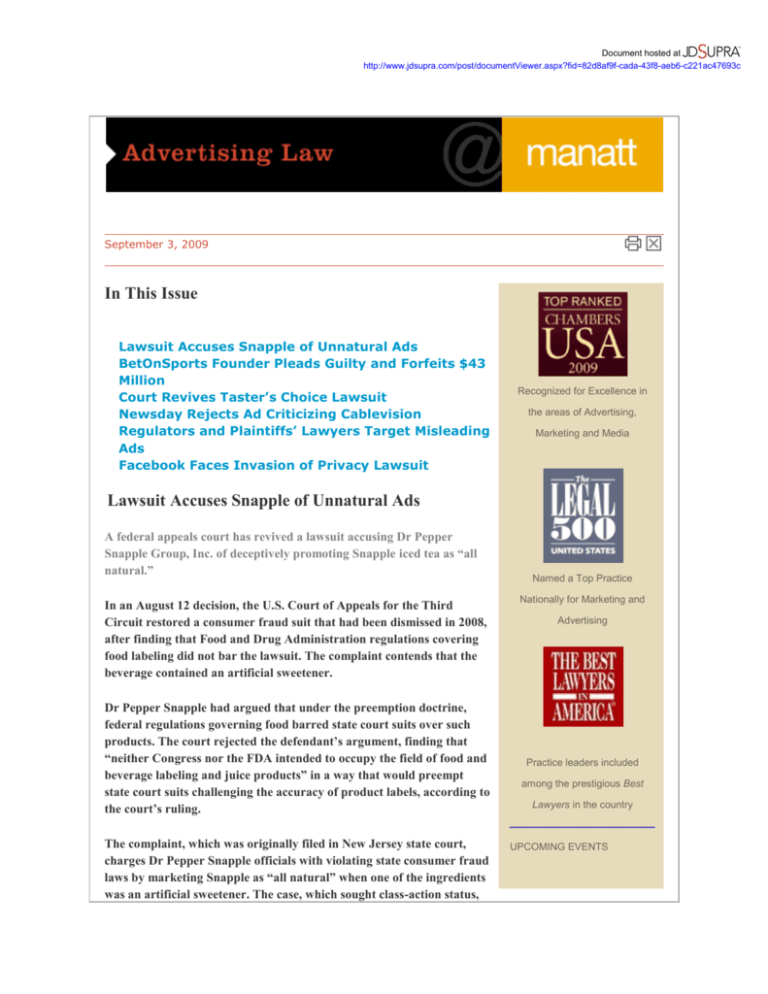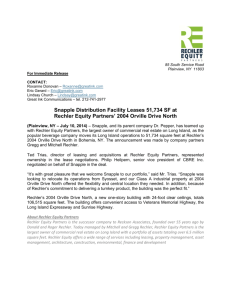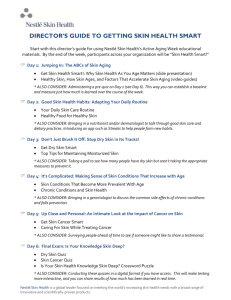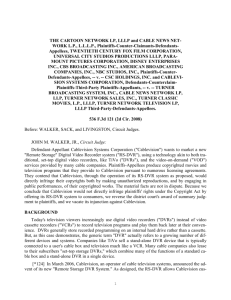
Document hosted at
http://www.jdsupra.com/post/documentViewer.aspx?fid=82d8af9f-cada-43f8-aeb6-c221ac47693c
September 3, 2009
In This Issue
Lawsuit Accuses Snapple of Unnatural Ads
BetOnSports Founder Pleads Guilty and Forfeits $43
Million
Court Revives Taster’s Choice Lawsuit
Newsday Rejects Ad Criticizing Cablevision
Regulators and Plaintiffs’ Lawyers Target Misleading
Ads
Facebook Faces Invasion of Privacy Lawsuit
Recognized for Excellence in
the areas of Advertising,
Marketing and Media
Lawsuit Accuses Snapple of Unnatural Ads
A federal appeals court has revived a lawsuit accusing Dr Pepper
Snapple Group, Inc. of deceptively promoting Snapple iced tea as “all
natural.”
In an August 12 decision, the U.S. Court of Appeals for the Third
Circuit restored a consumer fraud suit that had been dismissed in 2008,
after finding that Food and Drug Administration regulations covering
food labeling did not bar the lawsuit. The complaint contends that the
beverage contained an artificial sweetener.
Dr Pepper Snapple had argued that under the preemption doctrine,
federal regulations governing food barred state court suits over such
products. The court rejected the defendant‟s argument, finding that
“neither Congress nor the FDA intended to occupy the field of food and
beverage labeling and juice products” in a way that would preempt
state court suits challenging the accuracy of product labels, according to
the court‟s ruling.
The complaint, which was originally filed in New Jersey state court,
charges Dr Pepper Snapple officials with violating state consumer fraud
laws by marketing Snapple as “all natural” when one of the ingredients
was an artificial sweetener. The case, which sought class-action status,
Named a Top Practice
Nationally for Marketing and
Advertising
Practice leaders included
among the prestigious Best
Lawyers in the country
UPCOMING EVENTS
Document hosted at
http://www.jdsupra.com/post/documentViewer.aspx?fid=82d8af9f-cada-43f8-aeb6-c221ac47693c
was moved to federal court in 2007, and the next year a federal district
court dismissed the case on the grounds that it was preempted by FDA
regulations governing food labels. The same year, the company replaced
the artificial sweetener with sugar, according to court filings.
September 13, 2009
ERA D2C Convention
Topic: Women in Direct
Response
In the Snapple case, the Third Circuit found that Congress had not
intended to dominate the regulatory scheme for the food labeling
industry so completely that state court suits over label claims were
barred. “It does not appear that Congress has regulated so
comprehensively in either the food and beverage or juice fields that
there is no role for the states,” the court wrote.
Why it matters: The court‟s rejection of Snapple‟s preemption
argument is obviously not the end of the story. Presumably, the case will
now return to the lower court to be decided on the merits – i.e., whether
Dr Pepper Snapple violated the state consumer fraud laws by promoting
Snapple iced tea as “all natural.”
back to top
Moderator: Linda Goldstein
Paris Hotel
Las Vegas, NV
for more information
...
September 13, 2009
ERA D2C Convention
Topic: The B2C Claim Game;
Health and Beauty Edition
Speaker: Ivan Wasserman
Paris Hotel
Las Vegas, NV
BetOnSports Founder Pleads Guilty and Forfeits $43
Million
for more information
...
September 14, 2009
Gary Kaplan, the founder of BetOnSports, the defunct U.K. online
betting operation, has pleaded guilty in a U.S. court to charges of
conspiring to violate the federal racketeering and other U.S. laws.
Kaplan has also agreed to forfeit more than $43 million in criminal
proceeds, the Justice Department said.
In preparation for the plea deal entered in U.S. District Court in St.
Louis on August 14, Kaplan has transferred $43,650,000 here from a
Swiss bank account.
WESTDOC- The West Coast
Documentary and Reality
Conference
Session: Branding and
Integration: The New Reality
Panelists: Jordan Yospe of
Manatt, Phelps & Phillips, Chris
Coelen of RDF Media Group
If the judge accepts the terms of the plea deal, Kaplan will be sentenced
to a prison term of 41 to 51 months, the Justice Department said.
Kaplan‟s sentencing is scheduled for October 27. He has been in prison
without bail since his arrest in March 2007.
and Mark Koops of Reveille.
Doubletree Guest Suites Santa
Monica
Santa Monica, CA
Kaplan admitted in court that starting in the mid to late 1990s, he set up
offshore business entities in Aruba, Antigua, and eventually Costa Rica
to provide betting services to U.S. residents through Internet Web sites
and toll-free telephone numbers. Some of his Web servers were located
in Miami, and U.S. customers placed wagers over U.S. telephone lines.
for more information
...
September 15, 2009
ERA D2C Convention
Speaker: Linda Goldstein
In mid-2004, BetOnSports issued an IPO on the London Stock
Exchange‟s AIM market that earned Kaplan more than $100 million,
the Justice Department said. In 2006, under pressure from the Justice
Paris Hotel
Document hosted at
http://www.jdsupra.com/post/documentViewer.aspx?fid=82d8af9f-cada-43f8-aeb6-c221ac47693c
Department, BetOnSports shut down.
In June, three former employees of BetOnSports – the brother and
sister of Gary Kaplan and his former personal assistant – pleaded guilty
to federal racketeering charges in a U.S. District Court in St. Louis.
Las Vegas, NV
for more information
...
September 24, 2009
From The Source: AAF's Web
Why it matters: The Justice Department has engaged in a multiyear
campaign against Internet gambling, using laws that critics contend are
vague, ambiguous, and in some cases are contradicted by state law. Yet
anti-online-gambling efforts continue. Over the summer, the U.S.
Attorney of the Southern District of New York seized $34 million in
funds belonging to a reported 27,000 online poker players. Meanwhile,
the U.S.‟s battle against online betting is the source of an ongoing
dispute with the European Union. It remains to be seen how this
complex and multifaceted matter ultimately plays out.
Seminar Series
Topic: "Budget Busters: Bongs,
Blogs and Brand Wars"
Speaker: Jeff Edelstein
for more information
...
October 5-6, 2009
NAD Annual Conference 2009
back to top
Court Revives Taster‟s Choice Lawsuit
California‟s highest court has revived a long-running dispute over
Nestlé USA‟s use of a former model‟s image on its Taster‟s Choice
instant coffee label.
On August 17, the California Supreme Court sent the case back to the
trial court for a determination on how statute of limitations deadlines
should be calculated in defamation lawsuits involving product labels.
Russell Christoff first sued Nestlé USA in 2003 for an alleged act of
misappropriation of his likeness that started in 1998. According to
Christoff‟s complaint, in 1986, Nestlé Canada, an affiliate of Nestlé
USA, hired him to pose for a photo shoot. After being photographed
gazing at a cup of coffee with an expression conveying he enjoyed the
aroma, Christoff was paid $250 and given a contract providing that if
the company used his picture on a coffee brick label, it would pay him
$2,000 plus an agency commission. It also stated that payment for any
other use would require further negotiation. The company eventually
used Christoff‟s image on the coffee brick label, but did not inform or
pay him, he alleged.
While working on a new Taster‟s Choice label design in 1997, Nestlé
USA came across Christoff‟s image on the coffee brick label. Allegedly
believing the company had usage rights because the image had been
widely used in Canada, the employee never contacted Christoff or
investigated the scope of Christoff‟s consent.
In 1998, Nestlé USA began using a new label design with Christoff‟s
Moderator: Jeff Edelstein
W Hotel
New York, NY
for more information
...
October 7-9, 2009
Digital Music Forum West
Topic: "Digital Music Innovation:
What's Next?"
Speaker: Aydin Cajinalp
The Roosevelt Hotel
Los Angeles, CA
for more information
...
October 27, 2009
American Conference Institute's
3rd Annual Forum
on Sweepstakes Contests and
Promotions
Speaker: Linda Goldstein
The Carlton Hotel
New York, NY
for more information
...
Document hosted at
http://www.jdsupra.com/post/documentViewer.aspx?fid=82d8af9f-cada-43f8-aeb6-c221ac47693c
image on a variety of Taster‟s Choice jars and ads. In 2003, Nestlé USA
redesigned its label using a different model.
Christoff claimed he discovered the use of his picture in 2002 when he
happened to see a Taster‟s Choice can on a shelf at a Rite Aid store. He
sued Nestlé the next year for appropriation of likeness.
The trial court applied a two-year statute of limitations and instructed
the jury to determine whether Christoff knew or should have known
earlier that Nestlé had used his image. The jury found that Christoff did
not know, and should not reasonably have suspected that his image was
being used without his consent, and awarded him more than $15 million
in damages.
The Court of Appeal reversed, holding that under the single-publication
rule, because Christoff had not filed his lawsuit within two years after
Nestlé first “published” the label, his cause of action is barred by the
statute of limitations unless, on remand, the trier of fact finds that
Nestlé had hindered Christoff‟s discovery of the use of his photograph,
or that the label had been “republished.”
November 5-6, 2009
31st Annual Promotion
Marketing Law Conference
Topic: "The Battle of the
Brands"
Moderator: Chris Cole
Fairmont Hotel
Chicago, IL
for more information
...
November 5-6, 2009
31st Annual Promotion
Marketing Law Conference
Topic: "Sweepstakes &
Contests: Lend Me Your Ear
and I'll Sing You a Song..."
Speaker: Linda Goldstein
The California Supreme Court granted review. In its August 17 ruling,
it agreed with the Court of Appeal that the judgment must be reversed
because the trial court erroneously ruled that the single-publication rule
does not apply to claims for appropriation of likeness. But it did not
agree with the Court of Appeal that this meant Christoff‟s action
necessarily is barred by the statute of limitations unless he can show
that Nestlé had hindered his discovery of the use of his photograph, or
that the label had been “republished.”
Fairmont Hotel
Chicago, IL
for more information
...
November 18-20, 2009
4th Annual Word of Mouth
Marketing Association Summit
“The Court of Appeal‟s ruling presupposes that Nestlé‟s various uses of
Christoff‟s likeness, including its production of the product label for a
five-year period, necessarily constituted a „single publication‟ within the
meaning of the single-publication rule,” the court ruled. “Because the
parties were prevented by the trial court‟s erroneous legal ruling from
developing a record concerning whether the single-publication rule
applied, we remand the matter for further proceedings.”
Why it matters: The California Supreme Court‟s decision centers
around a complex interplay of legal doctrines, including the statute of
limitations, the single-publication rule, and rights of publicity, as they
apply to a somewhat unusual fact pattern. Nevertheless, it is an
interesting issue and we will keep you apprised of further developments
in this long-running dispute.
back to top
Topic: "FTC Developments"
Speaker: Anthony DiResta
Paris Hotel
Las Vegas, NV
for more information
...
Newsletter Editors
Jeffrey S. Edelstein
Partner
jedelstein@manatt.com
212.790.4533
Linda A. Goldstein
Partner
lgoldstein@manatt.com
212.790.4544
Our Practice
Whether you’re a multi-
Document hosted at
http://www.jdsupra.com/post/documentViewer.aspx?fid=82d8af9f-cada-43f8-aeb6-c221ac47693c
Newsday Rejects Ad Criticizing Cablevision
Newsday has rejected an ad by the Tennis Channel criticizing the
newspaper‟s parent company, Cablevision, for not carrying the
network.
“Thanks for nothing Cablevision,” says the ad, which shows a tennis
racket smashing a cable box. It adds, “You‟ve dropped the ball by
preventing your subscribers from seeing Tennis Channel‟s round-theclock coverage of the U.S. Open.” It invites Cablevision customers to
switch to DIRECTV, Dish TV, or Verizon FiOS for access to coverage.
The Tennis Channel said the ad, which ran two weeks before the U.S.
Open, was accepted by all other newspapers it was offered to, including
The New York Times, New York Post, Daily News, Westchester-Rockland
Journal News,and the Record of New Jersey.
Neither Cablevision nor Newsday would say who decided not to run the
ad. In a statement, Cablevision wrote, “The Tennis Channel ads are
nasty, unfair and intentionally misleading, and we don‟t think anyone
should carry them.”
Tennis Channel CEO Ken Solomon told The New York Times that after
four years of negotiations with Cablevision, the ad was “a court of last
resort.” He said the network has received “thousands of emails” from
Cablevision subscribers wanting to know why it doesn‟t carry the
channel.
In its statement, Cablevision said Tennis Channel‟s management was
“only interested in money,” and it would add the channel to its lineup
“tomorrow” if Solomon would agree to a fair deal.
Why it matters: Media platforms have been known to reject ads that
have the potential to unfairly injure other parties. But this ad is closer to
home – attacking the newspaper‟s parent company. Newsday‟s action
raises the question of the paper‟s independence from its parent. On the
other hand, the Tennis Channel, which ran the ads to build consumer
sentiment for its cause, generated extra publicity by playing up
Newsday‟s rejection of the ad.
back to top
Regulators and Plaintiffs‟ Lawyers Target
Misleading Ads
Advertising is coming increasingly under attack by plaintiffs‟ lawyers
national corporation, an ad
agency, a broadcast or
cable company, an ecommerce business, or a
retailer with Internet-driven
promotional strategies, you
want a law firm that
understands ... more
Practice Group Overview
Practice Group Members
Info, Resources & Links
Subscribe
Unsubscribe
Newsletter Disclaimer
Manatt.com
Document hosted at
http://www.jdsupra.com/post/documentViewer.aspx?fid=82d8af9f-cada-43f8-aeb6-c221ac47693c
and regulators, according to observers.
According to a 2008 Federal Judicial Center report, the number of
“consumer protection/fraud” class actions has climbed from 191 in 2001
to 489 in 2007. In 2007, such cases accounted for roughly one in five
class-action filings.
For example, Dannon Company is defending class actions in Ohio,
Florida, Arkansas, and New Jersey that allege the company overstated
the health benefits of its probiotic yogurt products Activia and
DanActive. Airborne Health, Inc. recently agreed to pay a total of $37
million to settle charges by consumers, the FTC, and a group of state
attorneys general that it made unsubstantiated claims about its coldprevention remedies.
Defense lawyers say the plaintiffs‟ bar is increasingly turning its sights
onto advertising cases in lieu of personal injury actions, where it has
become much more difficult to get class-action certification.
State attorneys general are also active on the ad front. For instance,
New York Attorney General Andrew Cuomo recently extracted a
$300,000 settlement from Lifestyle Lift for posting fake online consumer
reviews.
Under the Obama Administration, the Federal Trade Commission has
also ramped up its enforcement efforts on false and deceptive
advertising. One area the FTC is focusing on is behavioral advertising.
In February, the agency published guidelines calling for companies to
inform consumers how their online behavior is tracked, is collected,
what is done with that data, and how to opt out of any monitoring.
Why it matters: In the current environment of enhanced governmental
scrutiny of advertising and a plaintiffs‟ bar that is targeting allegedly
misleading claims in class-action suits, marketers would be smart to vet
all their claims carefully, or face the possibility of defending expensive
regulatory probes and class-action lawsuits.
back to top
Facebook Faces Invasion of Privacy Lawsuit
Facebook may be all about shameless self-promotion, but that isn‟t
stopping five people from suing the social networking company for
violating California privacy laws and for false advertising.
The complaint filed in California state court alleges that Facebook users
assume that personal information and photos they post on the site are
Document hosted at
http://www.jdsupra.com/post/documentViewer.aspx?fid=82d8af9f-cada-43f8-aeb6-c221ac47693c
shared only with authorized friends. “Users may be unaware that data
they submit ... may be extracted and then shared, stored, licensed or
downloaded by other persons or third parties they have not expressly
authorized,” the suit reads.
The complaint includes a lengthy description of an alleged massive datamining operation at Facebook, which it claims has transformed
Facebook from a social networking company to a data-mining company.
It charges the company with gathering and analyzing site content
without the knowledge or consent of its users.
Facebook said the lawsuit has no merit and that it intends to fight it.
This is not the first time Facebook has been criticized for its privacy
policies. Earlier this year, it changed its terms of use to claim, in essence,
perpetual ownership of all content loaded on the site. After users
complained, it omitted that provision from its terms of use.
Why it matters: Consumer advocates and some lawmakers express
concern over the privacy implications of behavioral advertising, in
which ads are targeted to individual users based on data collected from
them. However, social networking sites are experimenting with ways of
making their businesses profitable, and an obvious choice is behavioral
advertising. We expect to see more lawsuits against social networking
sites in the near future as this issue evolves.
back to top
ATTORNEY ADVERTISING pursuant to New York DR 2-101(f)
Albany | Los Angeles | New York | Orange County | Palo Alto | Sacramento | San Francisco | Washington, D.C.
© 2009 Manatt, Phelps & Phillips, LLP. All rights reserved.







